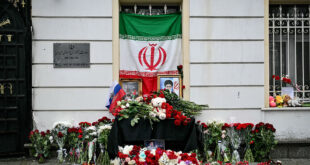Iraq’s election on October 10 saw the lowest voter turnout of any of its six polls since the 2003 US-led invasion of the country.
All the same the results met one of the major demands of the young activists who had pressed for early elections, and then urged a voter boycott – a loosening of Iran’s stranglehold on the nation. The Iran-supported parliamentary bloc emerged surprisingly and significantly weaker.
Iraq’s Al-Fatah Alliance is the political umbrella for a collection of Shia militias loyal to Iran’s Supreme Leader Ali Khamenei. Led by paramilitary leader Hadi al-Ameri, Fatah had held 48 seats in the Iraqi parliament. They emerged from the latest poll with only 17.
The dominance of Iran-supported elements within Iraqi society had long aroused public resentment. Iraq is dependent on its powerful neighbor Iran for gas and electricity, and for a vast range of goods and materials that support Iraqi industries. The value of bilateral trade is estimated at $1 billion per month. Yet many Iraqis resented the nation being converted into an Iranian satellite, and Iran-supporting politicians and organization were perceived as regressive, diehard and opposed to change.
Late 2019 and early 2020 witnessed huge public protests across Iraq in support of sweeping political and economic reforms and new elections. The demonstrations were suppressed by the security forces, dominated as they are by Iran-supported militias, and fired live ammunition and tear gas into the crowds. More than 600 people were killed and thousands injured while the protests persisted.
This heavy-handed reaction shocked the nation. It was no coincidence that initial outrage at the assassination in Baghdad on January 3, 2020 of Iranian general Qasem Soleimani – the man responsible for Iraq’s Iran-supported security forces – quickly faded, to be replaced by condemnation of Iran’s excessive influence in the governance of the country.
Leading up to the elections, a series of kidnappings and targeted assassinations by pro-Iranian militias killed more than 35 people and further soured the public mood. Responding to popular sentiment, the firebrand politician Muqtada al-Sadr began vigorously criticizing corrupt politicians, inept public authorities and Iranian influence, even though he is a Shia Muslim with links to Iran, and his supporters were active at all levels of state governance. The maneuver paid off. His 54-seat Saeroun movement, the largest bloc in the last parliament, was boosted to 73 seats
Consequently Sadr, who wants to end both US and Iranian influence over Iraq’s internal affairs, has claimed victory and promises to help form a government free from foreign interference – a government he will not be able to lead, since he himself did not stand as a candidate. His strengthened political position, though, will ensure that he has a leading role in the lengthy backroom negotiations to select a consensus prime minister and to agree on a new coalition. The big question is whether the approved candidate will be the current prime minister Mustafa al-Kadhimi.
Kadahimi, aligned to no political party, was chosen back in May 2020 as someone more or less acceptable to all interested players. In office he spent most of his time trying to hold the balance between competing interests within Iraq’s body politic. One of them was the US garrison attempting with varying success to maintain a degree of law and order. Kadhimi was recently informed by US President Joe Biden that all US troops will be withdrawn from Iraq by the end of 2021.
Anticipating that Iraq might become vulnerable to some sort of takeover by Iran-supported militias Kadhimi, in search of support, began hosting delegations from a range of countries. He also started talks on a new tripartite economic and political partnership with Egypt and Jordan. Egyptian President Abdel Fattah al-Sisi visited Baghdad in June, the first visit by an Egyptian leader in more than 30 years. Kadhimi’s efforts impact on Israel’s security, for if he does manage to shackle the militias, he can curb Iran’s practice of using them to transfer weapons to Hezbollah across the Syrian border. In addition Kadhimi has recently hosted negotiations between regional rivals Saudi Arabia and Iran.
He does not appear to have been adversely affected by these activities. He is still perceived as seeking to reduce Iranian influence within the organs of the Iraqi state. The election result, which points in that direction, might well result in his reappointment as prime minister.
Despite using the right language on reform, Kadhimi would still face an uphill battle to enact change. The old political interests are well entrenched, and will not yield their privileged positions easily. Kadhimi would need outside assistance, just as he did to guarantee a free and fair election. No less than twelve democratic nations issued a statement on October 6 praising him for his efforts in that direction. The UN and the EU sent teams to oversee the poll. More than 600 international observers were in place across the country, and new biometric fingerprint scanning voting cards were used for the first time.
If Kadhimi does take up the reins again, he would be strengthened if Western states increased their support for Iraqi civil society and exerted pressure on Iraq’s establishment to bring about political change. In a second term Kadhimi might find the strength to empower advocates of change and tackle structural reform. These are immense challenges in the context of the Iraqi situation. Yet they are necessary and the most effective way to forestall further instability in that insecure and unhappy country, for whose troubles the western world bears no little responsibility.
 Eurasia Press & News
Eurasia Press & News



